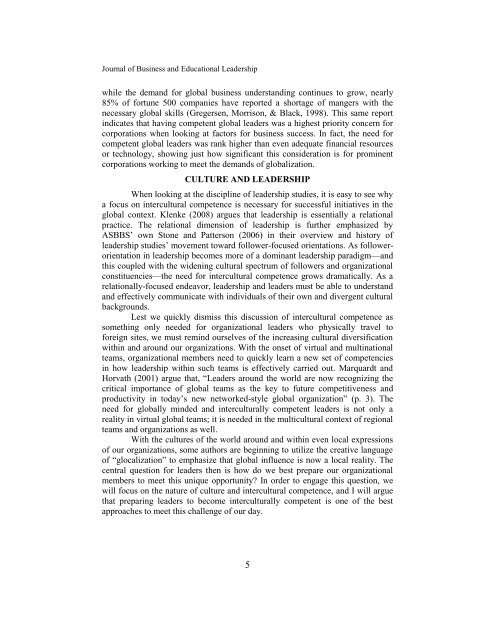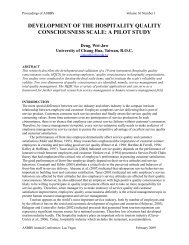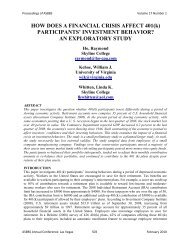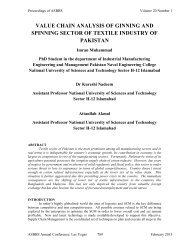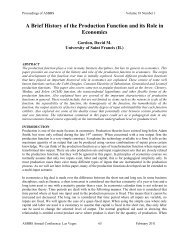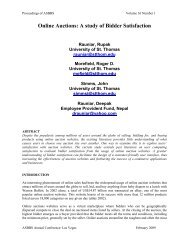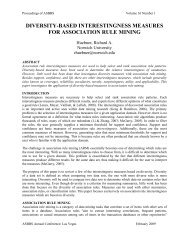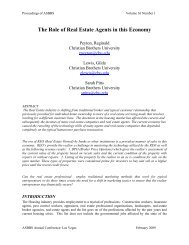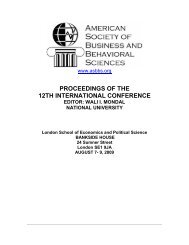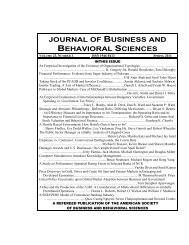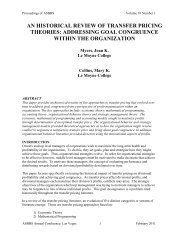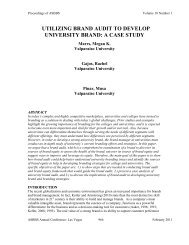journal of business and educational leadership - Asbbs.org
journal of business and educational leadership - Asbbs.org
journal of business and educational leadership - Asbbs.org
You also want an ePaper? Increase the reach of your titles
YUMPU automatically turns print PDFs into web optimized ePapers that Google loves.
Journal <strong>of</strong> Business <strong>and</strong> Educational Leadership<br />
while the dem<strong>and</strong> for global <strong>business</strong> underst<strong>and</strong>ing continues to grow, nearly<br />
85% <strong>of</strong> fortune 500 companies have reported a shortage <strong>of</strong> mangers with the<br />
necessary global skills (Gregersen, Morrison, & Black, 1998). This same report<br />
indicates that having competent global leaders was a highest priority concern for<br />
corporations when looking at factors for <strong>business</strong> success. In fact, the need for<br />
competent global leaders was rank higher than even adequate financial resources<br />
or technology, showing just how significant this consideration is for prominent<br />
corporations working to meet the dem<strong>and</strong>s <strong>of</strong> globalization.<br />
CULTURE AND LEADERSHIP<br />
When looking at the discipline <strong>of</strong> <strong>leadership</strong> studies, it is easy to see why<br />
a focus on intercultural competence is necessary for successful initiatives in the<br />
global context. Klenke (2008) argues that <strong>leadership</strong> is essentially a relational<br />
practice. The relational dimension <strong>of</strong> <strong>leadership</strong> is further emphasized by<br />
ASBBS‘ own Stone <strong>and</strong> Patterson (2006) in their overview <strong>and</strong> history <strong>of</strong><br />
<strong>leadership</strong> studies‘ movement toward follower-focused orientations. As followerorientation<br />
in <strong>leadership</strong> becomes more <strong>of</strong> a dominant <strong>leadership</strong> paradigm—<strong>and</strong><br />
this coupled with the widening cultural spectrum <strong>of</strong> followers <strong>and</strong> <strong>org</strong>anizational<br />
constituencies—the need for intercultural competence grows dramatically. As a<br />
relationally-focused endeavor, <strong>leadership</strong> <strong>and</strong> leaders must be able to underst<strong>and</strong><br />
<strong>and</strong> effectively communicate with individuals <strong>of</strong> their own <strong>and</strong> divergent cultural<br />
backgrounds.<br />
Lest we quickly dismiss this discussion <strong>of</strong> intercultural competence as<br />
something only needed for <strong>org</strong>anizational leaders who physically travel to<br />
foreign sites, we must remind ourselves <strong>of</strong> the increasing cultural diversification<br />
within <strong>and</strong> around our <strong>org</strong>anizations. With the onset <strong>of</strong> virtual <strong>and</strong> multinational<br />
teams, <strong>org</strong>anizational members need to quickly learn a new set <strong>of</strong> competencies<br />
in how <strong>leadership</strong> within such teams is effectively carried out. Marquardt <strong>and</strong><br />
Horvath (2001) argue that, ―Leaders around the world are now recognizing the<br />
critical importance <strong>of</strong> global teams as the key to future competitiveness <strong>and</strong><br />
productivity in today‘s new networked-style global <strong>org</strong>anization‖ (p. 3). The<br />
need for globally minded <strong>and</strong> interculturally competent leaders is not only a<br />
reality in virtual global teams; it is needed in the multicultural context <strong>of</strong> regional<br />
teams <strong>and</strong> <strong>org</strong>anizations as well.<br />
With the cultures <strong>of</strong> the world around <strong>and</strong> within even local expressions<br />
<strong>of</strong> our <strong>org</strong>anizations, some authors are beginning to utilize the creative language<br />
<strong>of</strong> ―glocalization‖ to emphasize that global influence is now a local reality. The<br />
central question for leaders then is how do we best prepare our <strong>org</strong>anizational<br />
members to meet this unique opportunity In order to engage this question, we<br />
will focus on the nature <strong>of</strong> culture <strong>and</strong> intercultural competence, <strong>and</strong> I will argue<br />
that preparing leaders to become interculturally competent is one <strong>of</strong> the best<br />
approaches to meet this challenge <strong>of</strong> our day.<br />
5


